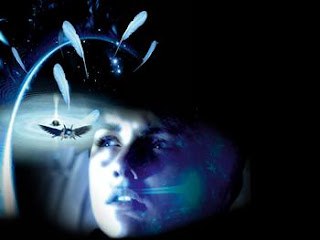The tale of Icarus gets a "science in fiction" overhaul as Brian Greene's book is transformed into a multimedia experience.
Narrated by David Morissey, featuring a film by Al + Al and an original score by Philip Glass, the European premiere at the Royal Festival Hall started with the Dr. Atomic Symphony by John Adams. It was a fine start, fit for the main event, as it is an opera about the life of Dr J Robert Oppenheimer, who is behind the atomic bomb. Considering the heavy physics behind the concept of the event, there was a quick lecture on how black holes function and what effects they produce given Einstein's theory of relativity, and then it was time for the main event.
In Greek mythology, Icarus uses the wings constructed by his father from wax and feathers to escape from Crete. His curiosity gets the better of him when he flies too close to the sun and his wings melt away. As such, Icarus falls to the sea and drowns. Brian Greene's book, published in 2008, reworks the myth and situates it in deep space. Icarus is the son of the captain of a ship sent out to deep space to investigate alien life forms. On their way, they encounter an unchartered black hole. Icarus, overtaken by his curiosity and eager to try his prototype spaceship, flies out to the black hole to show his father that he can make it there and back. He does achieve this fantastic voyage, but he fails to factor in the effect of the black hole on time, slowing it to such a degree that a second near the black hole translates to hundreds of years in the normal fabric of space-time.
The premise of the story deserves a lot of interest as it's scientifically accurate, hence "science in fiction", and yields great dramatic value. There are undertones of personal struggle as well, as Icarus slightly disdains his ancestors for making the decision for him to be born into this spaceship only to ensure continuity of the mission since it takes many generations to reach its destination. Philip Glass' original score has the right tones and intensity to deliver this emotional weight of the story. However, I can't say the same for the film, which lacks the artistry of the music or the narration.
As the main drawback of the event, the film simply comes off as unprofessional. The simple geometric shapes and the use of flashing colors may all be well intended, but the experimental approach taken in the production of the film unfortunately diminishes the overall effect and clashes with the narration, which is rather straightforward. It almost seems like the different elements of the production are at odds with each other. An unsettling aftertaste.
Film is the right medium to tell Icarus' story, especially with Glass' fantastic score, but it needs more maturity especially considering the fact that there is narration involved. A better way to present this story though would be through a feature length film where the director can really explore the emotional depth of being born into a traveling home with a mission. Having that huge decision made for you would anger anyone, and a kid would most likely respond in the manner Icarus does. It propels him towards the black hole, from which there is no return even if you survive. Black holes can warp time and slow it down, but time always travels one way - into the future. And what awaits at the end of your journey is even more fantastical.

No comments:
Post a Comment